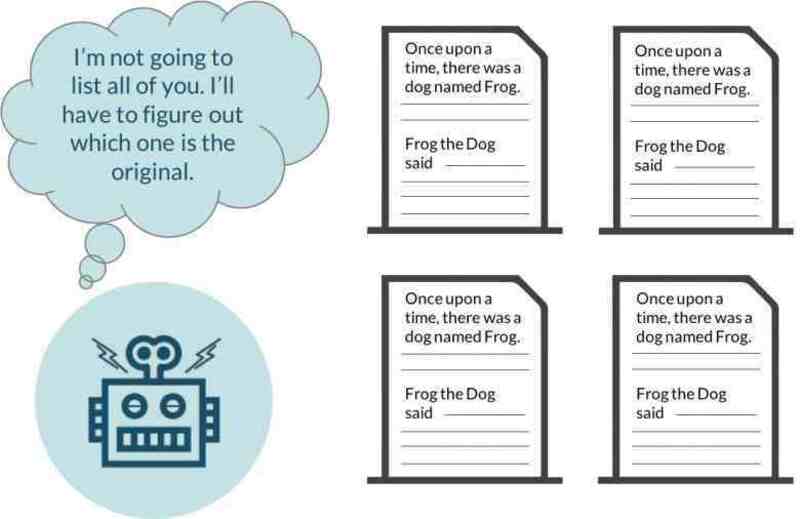What is Considered Duplicate Content?
What is considered duplicate content?
Duplicate content is material that appears in the same form in two or more different places. It can arise for a variety of reasons. For example, poor site architecture - where a site accidentally creates multiple copies of certain pages - can result in identical content. If a spam site copies content from another website, that can also result in several versions of a page.
There may also be times when site owners want to purposefully create matching content, such as for content syndication or because they want to include a PDF version of a particular page on their site. These instances need to be carefully handled to avoid duplicate penalties.
Use Canonical Tags To Display Original Content
Does duplicate content really matter?
Google’s main objective is to provide users with high-quality search results. If they return multiple results with the same content, they are providing their users with a less-than-optimal experience. Users would have more trouble finding the sites and content that answer their unique needs if they are given a list of ten sites that contain the same information. For this reason, Google has made it clear that they penalize sites with replicated content.

How can I stop SEO duplicate content?
There are a few ways to avoid replicated content. If you are purposely syndicating content or you would like to have more than one version of a particular page of content on your site - such as an HTML version and a PDF version - using a rel=”canonical” tag can let Google know which page was the original and which one was purposefully duplicated. This will let the search engine know which one should be ranked in search engine results. If you are syndicating content on a site that does not want a rel=”canonical” tag, you can use a NoIndex tag or an attribution link, although these methods are less ideal.
You can also utilize 301 redirects for content or duplicate pages that have been permantely moved. 301 redirects are part of healthy SEO methods. Redirecting your page with a 301 will help you eliminate matching content.
Within your own site, it is a good idea to regularly run a site audit, such as the one offered by BrightEdge, to check for any duplicate content. If you find multiple pages, you can delete the extras or use the canonical tag, depending upon your needs.
Taking the steps to understand and avoid duplicate penalties can help you maximize your content exposure while maintaining a strong reputation with Google and your visitors. It's important, for your SEO health and success, to practice both on page and technical tactics. If your site is being picked up by Google for having reciprocated content, not only will you be penalized then but it can also impact your results in the future. Having successful SEO strategies will keep your site in check going forward. Work to lift traffic and rankings on a regular basis with healthy SEO.
What is considered duplicate content?
Duplicate content is material that appears in the same form in two or more different places. It can arise for a variety of reasons. For example, poor site architecture - where a site accidentally creates multiple copies of certain pages - can result in identical content. If a spam site copies content from another website, that can also result in several versions of a page.
There may also be times when site owners want to purposefully create matching content, such as for content syndication or because they want to include a PDF version of a particular page on their site. These instances need to be carefully handled to avoid duplicate penalties.
Use Canonical Tags To Display Original Content
Does duplicate content really matter?
Google’s main objective is to provide users with high-quality search results. If they return multiple results with the same content, they are providing their users with a less-than-optimal experience. Users would have more trouble finding the sites and content that answer their unique needs if they are given a list of ten sites that contain the same information. For this reason, Google has made it clear that they penalize sites with replicated content.

How can I stop SEO duplicate content?
There are a few ways to avoid replicated content. If you are purposely syndicating content or you would like to have more than one version of a particular page of content on your site - such as an HTML version and a PDF version - using a rel=”canonical” tag can let Google know which page was the original and which one was purposefully duplicated. This will let the search engine know which one should be ranked in search engine results. If you are syndicating content on a site that does not want a rel=”canonical” tag, you can use a NoIndex tag or an attribution link, although these methods are less ideal.
You can also utilize 301 redirects for content or duplicate pages that have been permantely moved. 301 redirects are part of healthy SEO methods. Redirecting your page with a 301 will help you eliminate matching content.
Within your own site, it is a good idea to regularly run a site audit, such as the one offered by BrightEdge, to check for any duplicate content. If you find multiple pages, you can delete the extras or use the canonical tag, depending upon your needs.
Taking the steps to understand and avoid duplicate penalties can help you maximize your content exposure while maintaining a strong reputation with Google and your visitors. It's important, for your SEO health and success, to practice both on page and technical tactics. If your site is being picked up by Google for having reciprocated content, not only will you be penalized then but it can also impact your results in the future. Having successful SEO strategies will keep your site in check going forward. Work to lift traffic and rankings on a regular basis with healthy SEO.
